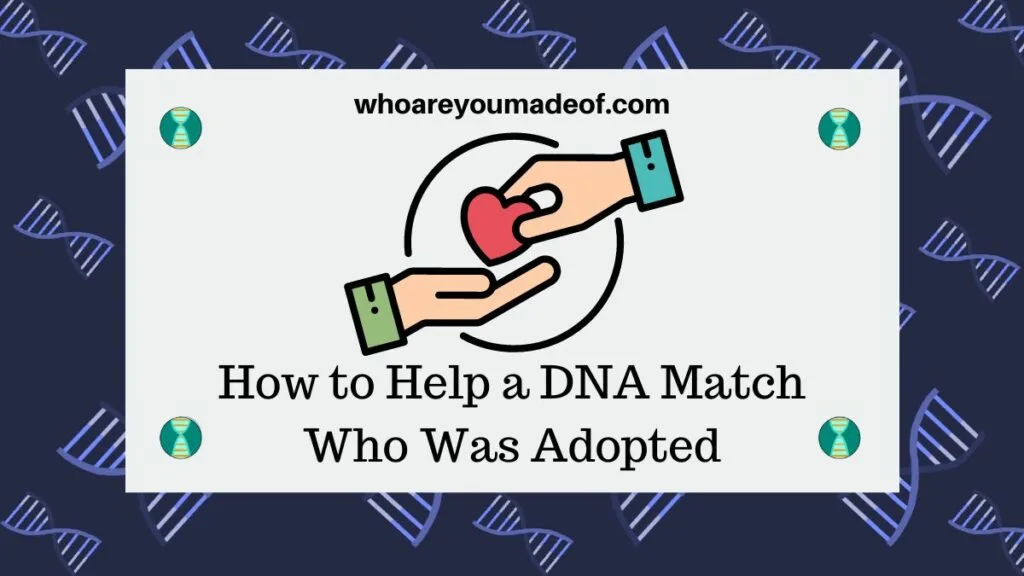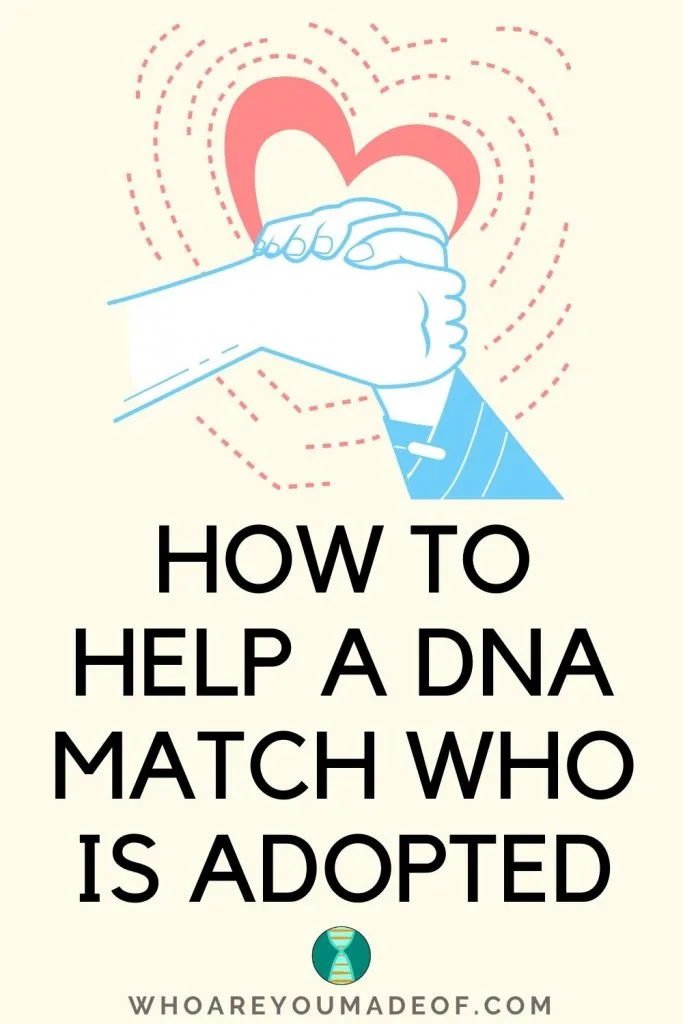If you have been contacted by a DNA match who was adopted, or you’ve reached out to a match and discovered they are adopted, and you’d like to help them, this post is for you. It’s wonderful that you want to be a good DNA cousin and family member to your newly discovered relation!
In this post, you’ll learn:
- Ideas to help your adopted cousins search for their biological family
- What to do – and what not to do – when helping your cousin
- Concrete ways you can help them with their research

It’s important that you only help your adopted DNA match if they ask you to. It’s also okay to offer to help them out if you want to, but always wait for their permission before you really start looking into their situation.
Believe it or not, I have been contacted several times by people trying to assist their adopted relations with their DNA results without their permission, and it never ends well. It’s always best to get permission first and make sure that your cousin’s expectations are realistic about what you may or may not be able to accomplish.
Find out what your DNA match would like to achieve – why did they decide to take a DNA test?
Your cousin may not want to know everything that it is possible to learn, or they may want to learn everything. They may want to explore their history without making contact with their close biological family, or they may be looking for a potential relationship.
Or, they may not be sure of what they want yet.
Additionally, your DNA match may not be sure about what they can actually learn from their DNA results. Some people take DNA tests on the advice of well-meaning family and friends without a sense of what type of information might be revealed by their DNA results.
Their DNA results may disappoint them, or overwhelm them. As a relative, it’s good for you to find out where they are in their search and where they’d like to go and be up front to them about how much you might actually be able to help.
Let them know that it can be hard work
Sometimes, people get “lucky” and they have a parent or sibling DNA match pop up on their list, and their search is over 30 minutes after their results came in. While this does happen, it’s not how it usually happens, and it’s important to let your cousin know that it can take some time and a good amount of research before you feel like you are making progress.
Go slowly, don’t overwhelm your adopted cousin
A few months ago, I noticed a new DNA match pop up on my match list. Because of the matches that they shared with me, the amount of DNA they shared with my mom, and their ethnicity (I know, it’s crazy but true!), I was almost 100% sure that I knew exactly how she was related to me.
By that evening, we were on the phone with each other and she was just so incredibly over whelmed with the fact that I could tell her who her grandparents and great-grandparents were, and any number of things she had always wanted to know about her family since she learned she had been adopted as a young child.
One of her questions was how in the world I could be sure about how we are related. I live and breathe DNA, I write about it, I dream about it, and it’s basically my entire life. Restraining myself and giving her just the basic facts was one of the most difficult things that I have had to do. It was worth it, however. The few basic facts I gave her left her curious to learn more, and we eventually corresponded to help her fill in the blanks.
So instead of discussing centimorgan this, and shared matches that, and uploading and transferring and chromosomes and DNA segments and autosomal and triangulation and …. phew! You get my point. Just start slow, and move at the pace of your newly discovered cousin.
To find living relatives, it’s best to upload DNA to as many sites as possible to get more DNA matches
When your cousin is ready to learn more than what is available on the website where their DNA test was done, you might suggest to them that the best way to learn about one’s biological family is to get as many DNA matches as possible.
The most efficient, and least expensive, way to do this is for your cousin to download their DNA and upload it to a few different websites that accept transfers of autosomal DNA results.
The following websites accept uploads:
- My Heritage DNA
- Family Tree DNA
- Gedmatch
- Living DNA (matching coming late summer or early fall 2018)
If your cousin wonders why they should do this, explain to them that each DNA match could:
- potentially reveal key information leading to your cousin’s biological family
- have information, such as a family tree posted to their account, that can help you piece other bits of information together
- via shared matched, or matches that you have in common with someone else, help you figure out key details about some of your other DNA matches
Divide and conquer
If your new cousin is brand-new to genealogy and family tree research, you can help them learn by telling them exactly how they can help you help them learn about your family. It could be as simply as trying to locate obituaries online for a certain family member, obtaining documents, or building a mirror tree.
By splitting up the work, you now have two sets of eyes that can spot a pattern or a connection that only one person might have missed.
Share information with your DNA match – and keep it organized
As you proceed with your joint research, it’s great to have a system for sharing information. One of my cousins had the great idea of using a Google Spreadsheet for keeping track of all of the people that we came across with a particular surname.
We would make a note of where we found the surname, and add biographical details as known, as well as notes. You could do something like this, or just even a Google Docs document where you can both make notes to each other about what you have found.
Never contact anyone on behalf of your adopted cousin
You should never contact anyone on behalf of your adopted cousin unless your cousin has explicitly asked you to do so. Depending on how closely or distantly you are related to your cousin, you may or may not have a close relationship with their immediate family or close cousins.
Initial contact with close biological family is an incredibly important first step, and you want your cousin to be in charge of when, how, and if this occurs.
Since every family is different, I would suggest that even 2nd-3rd cousins should be considered “close” family in this circumstance. For example, in my own family, I grew up knowing some of my second cousins quite well, and my children know their second cousins once-removed – and I won’t be surprised if the next generation (third cousins) maintain some sort of relationship.
This means that you should be careful when corresponding during your research that you don’t reveal information about your adopted cousin that they would wish to keep private.

Conclusion
I hope that this post gave you some good ideas as to how you can best help your adopted cousin with their search. If you have any questions about this post, or would like to share your own experience about helping a DNA cousin find their biological family, I would love to hear from you in the discussion below.
Thanks for stopping by!
